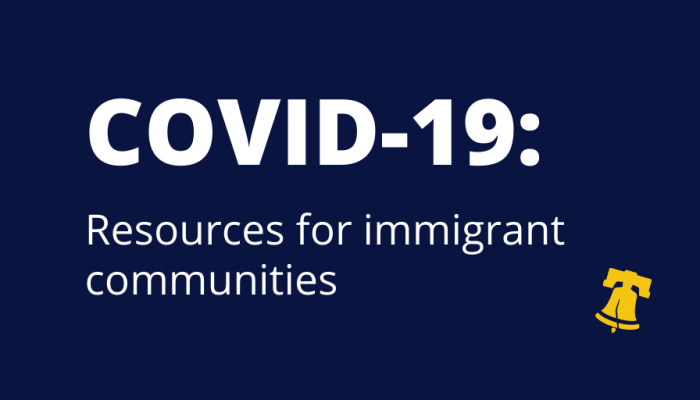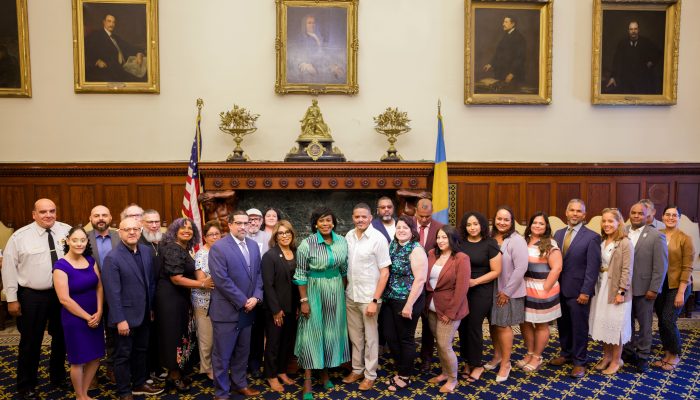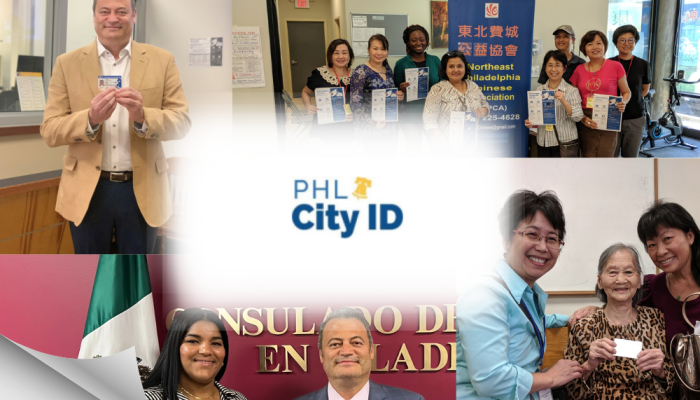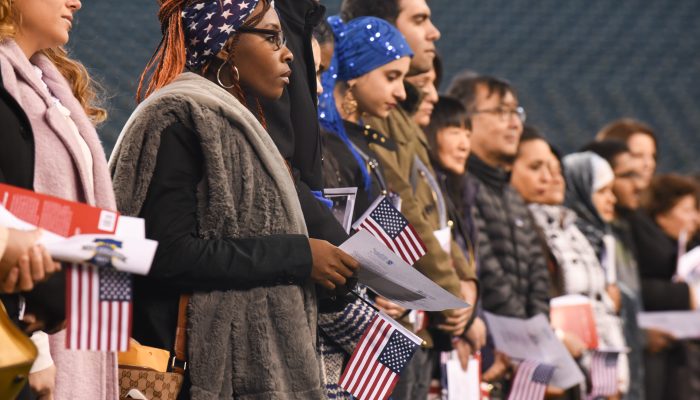This page is no longer being updated. Please visit the COVID-19 home page for the latest accurate information.
The following is a list of resources for immigrants, refugees, asylees, and organizations serving these communities in Philadelphia.
To speak to a health care professional about COVID-19, call 1-800-722-7112, dial 3-1-1 with questions about City services, or visit www.phila.gov/covid-19 for the latest updates.
In this time of uncertainty, be sure all information on COVID-19 is from a trusted source.
General Information
Information available in other languages
- Important information is regularly translated into Spanish, Simplified Chinese, Vietnamese, Russian, and French.
- Select information is available in other languages, including Haitian Creole, Swahili, Khmer, Indonesian, and Korean.
- Information from community organizations may or may not be translated into additional languages.
Staying Informed
City Updates
- For general information, visit www.phila.gov/covid-19. Translated resources are available.
- For updates on the City’s COVID-19 response, you can watch the virtual briefings. Public live streams are on:
- The Department of Public Health’s Twitter (@PHLPublicHealth) and Facebook accounts.
- Phila.gov/PHLgovTV.
- Comcast channels 64 and 1164.
- Verizon channels 40 and 41.
- For alerts sent to your phone, text COVIDPHL to 888-777.
- For health-related questions, call 1-800-722-7112.
- For questions about City services, call 311. Interpretation is available. Please wait for an operator to request your language.
Damage from Tropical Storm Isaias
The heavy rain and high winds of Tropical Storm Isaias caused flooding and power outages in the City. You can find the latest information on the City’s response along with resources available here.
SEPTA Updates
Please check septa.org for the latest schedules.
All SEPTA passengers are required to wear a face mask or covering. Regular service schedules are in effect, however, the Cynwyd and Chestnut Hill West Lines are suspended. The 12th & Filbert doors at Jefferson Station and the 16th & JFK doors at Suburban Station will be open during the following hours: 6:30 a.m. to 9:30 a.m. and 3:30 p.m. to 6:30 p.m. During all other hours these doors will be locked.
School District of Philadelphia Updates
On Thursday, July 30th, the Board of Education approved the proposed changes to the District’s reopening plan and the 2020-2021 Academic Calendar. The school year will start on Wednesday, September 2, 2020, and all K-12 students will engage in digital learning five days per week. For more detail, please visit the School District of Philadelphia website.
Please visit the School District of Philadelphia’s Coronavirus Information Hub for most recent updates.
PHLConnectED: Connecting K-12 students to the internet
The School District of Philadelphia will be re-opening remotely this fall.
City leaders have outlined a $17.1 million plan to provide 35,000 households with free internet in order to allow all Philadelphia students to participate in virtual classes.
Families will be set up with broadband connections through Comcast. Mobile hotspots will be provided for students who are homeless or transient.
For more information about how to connect Philadelphia students to the internet, click here.
Access Centers
Beginning on September 8th, the City will open 31 free “Access Centers” across the city for students who can’t stay at home during days of online education.
Most of the centers will serve around 22 students each and will require registration, with priority given to students with the highest need. The centers will be open on weekdays from 8 a.m. to 4:30 p.m. Students will be supervised and receive meals and recreational activities.
For more information about Access Centers, click here.
PHL Pre-K
PHLpreK is the City of Philadelphia’s FREE quality pre-K program that gives children a strong foundation for their education. Enrollment for PHLpreK is open! The City is offering free, quality pre-K at over 130 locations throughout Philadelphia this year. Please note that all providers must follow new safety and cleaning protocols, in compliance with guidance from the Centers for Disease Control and Prevention (CDC) and the Philadelphia Department of Public Health. These include:
- Mask requirements
- Social distancing and limited class sizes
- New cleaning protocols.
The safety of PHLpreK students, families, and staff is the top priority.
Learn more about how to sign up for free, quality pre-K through PHLpreK.
Streets Department Updates
Trash and recycling pick-up has been experiencing delays throughout the city. For more information and other COVID-19 updates please visit the Streets Department website.
Census 2020
Philadelphia’s post COVID-19 recovery depends on a complete and accurate Census 2020 count. If you haven’t responded to the census yet, take 5 – 10 minutes today and do it online.
For immigrants and friends of immigrants, Philly Counts 2020 is continuing to remind folks about the importance of the 2020 Census and encourage Philadelphians to participate. Help them get the word out by using your social platforms to remind your network that everyone can participate in the 2020 Census. Everyone counts here regardless of where they come from or for how long they have been in this country.
Check out this social media toolkit to support Philly Counts by promoting Census 2020.
How to Stay Safe
Mandatory mask order
On Friday, June 26, Mayor Kenney signed a Mandatory Mask Order, which requires masks to be worn in any indoor public spaces and outdoors if there is less than six feet between people from different households. There will be only a limited number of exceptions, including for children under 8-years-old. This order will not be enforced by the police. The goal is to send a clear message that mask usage cannot and should not be optional while cases continue to rise across the country.
Indoor Dining
Indoor dining is back in Philadelphia starting September 8, 2020. Most of Philadelphia’s guidelines and restrictions are consistent with statewide rules—all of which aim to keep people healthy while gradually and safely reopening.
Here are some new guidelines and updates you should know:
- A maximum of four people can be seated together inside. If you have more than four people in your party, you will be at separate tables that are at least six feet apart. Six people per table are allowed for outdoor dining.
- You’ll see fewer people around you. Restaurants cannot allow more than 25 percent of their normal capacity.
- You cannot sit at a bar. Alcohol can be served only for on-site consumption at your table when in the same transaction as your meal.
- Servers must wear both masks and face shields for additional protection. Diners must wear masks when they aren’t seated at their table.
- Restaurants will be installing sneeze guards or partitions in their kitchens and at cash registers, host stands, and food pickup areas, where maintaining physical distance of at least six feet is difficult.
Most importantly, if you don’t feel well, do not risk other people’s health—stay home!
Restaurant owners and operators: View the full list of restrictions for restaurants and food trucks.
Contact Tracing
About Contact Tracing
Contact tracing is an important tool that health departments use to fight diseases. In general, contact tracing involves identifying people who have an infectious disease and their “contacts” (people who may have been exposed) and working with them to stop the spread of the disease.
Participation in contact tracing is voluntary. People can decline to participate at any point, but participating fully can help stop the spread of the disease and save others’ lives.
Right now, contact tracing is one of the best ways we have to stop the spread of COVID-19, also known as the coronavirus.
Contact Tracing is Confidential and Secure
Case investigators and contact tracers will never:
- Release information collected from COVID-19 tests or by our contact tracing staff to any law enforcement agencies, including ICE.
- Ask about your immigration status.
- Tell a contact who gave us their contact information.
- Ask for Social Security numbers, credit card numbers, or bank account numbers.
Check out this page for more information about contact tracing in Philadelphia.
Follow Public Health Guidelines
- Wash your hands, keep six feet apart to practice social distancing, wear masks to protect yourself and others, and stay home when at all possible. More details are here.
- Wearing a mask in public. It is one of the best ways to protect yourself and others. Read these tips for how to wear your mask.
- Remind yourself with the Health Department’s Community Leader Talking Points and Social Distancing Posters.
Get Tested
The City of Philadelphia has launched a new testing site finder to help people locate COVID-19 testing sites. The finder is available in six languages, and the map will be updated regularly as new testing sites change. Testing sites are operated by many different organizations, including hospitals, urgent care clinics and pharmacies, as well as the City of Philadelphia. Please go to the individual site’s contact information for more details. Testing for COVID-19 is free and never requires proof of citizenship.
Who should get tested:
The Philadelphia Department of Public Health recommends getting tested for COVID-19 if:
- You have been exposed to someone with COVID-19 (wait until 7 days after exposure to ensure test accuracy) OR
- You have symptoms of COVID-19, including:
- Cough
- Shortness of breath OR
- Two of these symptoms: fever, chills, muscle pain, sore throat, new loss of taste or smell
Testing may be prioritized at certain sites for people with the above symptoms who:
- Are hospitalized.
- Have chronic medical conditions.
- Reside or work in congregate settings, including nursing homes, behavioral health facilities, shelters, and prisons.
- Are healthcare, public safety, or other essential workers (such as Police, Fire, EMS, mass transit, grocery and pharmacy staff).
- Are close contacts of known cases or associated with a known cluster of cases.
Employers should not require proof of a negative test for return to work. Instead, follow recommendations for how long a sick employee should isolate at home.
For more information on testing, call your healthcare provider or visit our FAQ about getting tested in Philadelphia. You can also call the 24/7 coronavirus helpline at 800-722-7112 to speak with a health care professional or submit a question to the Philadelphia Department of Public Health via our website.
Find out if you’re eligible
Each testing site has its own requirements, and that information is included for each location on the map. No testing sites require payment, insurance or proof of citizenship. But some sites may:
- Limit testing to people who meet certain criteria.
- Require an appointment.
- Require a referral from a healthcare provider.
- Ask you to stay in your car (for drive-thru sites).
Be sure to call ahead since most sites require an appointment. Phone numbers are available on the map.
You can receive medical care regardless of your citizenship status and your ability to speak English. Read about Philadelphia’s welcoming policies and your rights in medical settings.
Find a COVID-19 testing site near you
Where to Get Help
Public Benefits
Financial relief: Apply for federal and state benefits
The Pennsylvania Department Human Services recently reported that applications for state-issued benefits have not increased above pre-pandemic levels. For residents who have experienced job loss or pay cuts in the wake of COVID-19, these programs can provide much-needed help to get through this difficult time.
A snapshot of available benefits:
- SNAP: Up to $650/month for a family of four
- Medicaid: Free or very low-cost health insurance
- Cash assistance: Up to $500/month for a family of four
- Utilities: Maximum benefit of $800
Residents can apply online for these benefits at the state’s online application at compass.state.pa.us. If you need help applying for benefits, call the City’s BenePhilly program at 833-373-5868.
Depending on the benefit, the public charge ruling may apply to your case. To confirm your eligibility, please visit Protecting Immigrant Families to verify.
For more information on benefits and eligibility, check out this blog post.
Other updates
- Receiving medical care for COVID-19 does not count towards public charge determinations. For more information, visit USCIS or call Community Legal Services at 215-981-3700.
- Unemployment benefits do not count toward public charge determinations according to USCIS. Check the Pennsylvania Office of Unemployment Compensation for updates as benefits may be expanded. Contact Philadelphia Legal Assistance and Community Legal Services with more questions.
- BenePhilly can help you apply for different benefits. Call 844-848-4376.
- PCCY can help you get medical insurance for your child and you. Call 215-563-5848, ext. 17 for help in your language.
- Eligibility for Emergency Medical Assistance has been expanded to cover COVID-19. Contact Community Legal Services for information on how to apply.
Help for Food
The City has launched a food finder (http://phila.gov/food) that provides information in six languages and includes the City-supported food program, student meals, senior meals, and outdoor locations.
There are also free resources for pregnancy, breastfeeding, baby and toddler support available during COVID-19.
Help for Housing and Utilities
- Low-cost internet and mobile phone services.
- Evictions and foreclosures are temporarily suspended.
- Water, gas, and electricity shut offs are also suspended.
Rental Assistance for tenants affected by COVID-19
PHDC is now accepting applications for Phase 2 of rental assistance. Renters and landlords may submit their application online, by fax, or by mail. Funds will be awarded on a first-come, first-served basis. PHDC will accept applications until September 30 or until the funding runs out. For more information on if you qualify and how to apply, visit PHLrentalassist.org.
Mortgage Assistance for homeowners affected by COVID-19
Pennsylvania Housing Finance Agency (PHFA) is now accepting completed applications for pandemic mortgage assistance on their website. All assistance is subject to the availability of funds.
Your Rights in the Workplace
- On June 26, 2020, Mayor Kenney signed the Employee Protections in Connection with COVID-19 Emergency Health Order law into effect. This law protects employees who “blow the whistle” on employer health violations during COVID-19. Check out this blog from Mayor’s Office of Labor to get more information.
- Philadelphia has expanded its Paid Sick Leave ordinance in light of COVID-19. Covered employees can use their paid sick leave for COVID-19 related issues and preventative care without fear of retaliation.
- Philadelphia’s Fair Work Week Law is in effect. See what parts of the law apply during the pandemic.
- For more information on your rights in the workplaces, visit Community Legal Services’ Frequently Asked Questions.
Help for Mental Health, Addiction, and Intellectual Disabilities
- The City of Philadelphia offers mental health, addiction, and intellectual disability services.
- For mental health and addiction services, call the Community Behavioral Health 24/7 hotline at 888-545-2600.
- For mental health crises, call the crisis hotline 24/7 at 215-685-6440.
- For individuals in need of immediate opioid treatment support, contact NET Access Point at 844-533-8200 or 215-408-4987.
- For intellectual disability services, call the Department of Behavioral Health & Intellectual disAbility Services at 215-685-5900.
- Resources are available to promote safer substance use during COVID-19.
Help for Domestic Violence
- Protection from abuse and domestic violence is available during COVID-19.
- The Philadelphia Domestic Violence Hotline is open 24/7 at 866-723-3014.
- If you want legal protection, you can seek assistance at the Emergency Filing Unit at the Criminal Justice Center, Room B-03 1301 Filbert St., Philadelphia, PA 19107.
- Call the Women Against Abuse Legal Center at 215-686-7082 with a safe number for an advocate to return your call.
- Nationalities Service Center has safety planning resources, hotlines, and legal help in multiple languages. Their secure hotline can be reached at 215-893-8400.
- Women Organized Against Rape (WOAR) has a 24/7 hotline at 215-985-3333 for survivors of sexual misconduct, sexual harassment, and sexual assault. Call 215-985-3315 for more information about WOAR services.
Reporting Hate Crimes and Bias Incidents
- COVID-19 affects us all. Hate crimes based on ethnicity and fear of coronavirus are illegal.
- Contact the Philadelphia Commission on Human Relations at pchr@phila.gov or 215-686-4670 to report incidents of hate and bias.
- Additional resources from the Pennsylvania Human Relations Commission on hate crimes across the state.
Statewide Resources
- The State of Pennsylvania website has more updates on COVID-19. Check here, too, for guidance on voting and unemployment benefits.
- The Pennsylvania Immigration Citizenship Coalition has a guide for resources related to COVID-19 in Pennsylvania.




